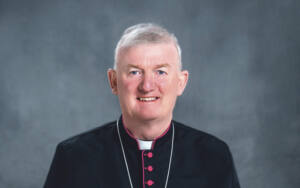Remembering St John Paul II’s inspiring evangelisation
Published on 3rd Aug, 2024

WelCom August 2024
Bishop John Adams, Bishop of Palmerston North Diocese
Pope Francis is often quoted as having said, as a Catholic community, we are less living in an era of change than a change of era. I personally agree with this observation. Other commentators have suggested, again correctly in my view, that we are entering once again into an apostolic age, having spent the last 16 centuries as a Church living in the age of Christendom.
I offer these observations as we, the members of the Roman Catholic community in New Zealand, face the prospect of bringing the Gospel to those who live in these times. How might we do this with great power and conviction? One answer to this question, as to how we might overcome the challenges of evangelising in our day, is to turn to those who have gone before us. St Pope John Paul II for instance was faced with a similar challenge. As a young man he found himself living under the grip of a godless regime in his native Poland. He saw and understood what it was to encounter a ruling power, which claimed that our Christian faith ought to be consigned to history.
A useful insight into the nature of this Soviet world view is contained in the story of Nowa Huta an industrial town build by the communist government just on the outskirts of Krakow, the ancient capital city of Poland, and under the pastoral care of the young Bishop Karol Wojtyla. Beginning in 1949, this exercise in social engineering was built around a massive steel works, which was a gift from the Soviet government. This small city was built to model a communist world view. It was carefully planned to foreshadow a society without Christian faith, and consequently was the first city in Poland to be built without a Catholic Church. This decision of the communist regime to block the building of a church for this community played out for the next 20 years, with +Karol Wojtyla continually advocating for a place of worship within Nowa Huta. Finally, on the day of John Paul’s 49th birthday, and shortly before he was to be called to Rome, construction began on a church. The build would take another decade with most of the labour coming from volunteers who would go to work on the church after a full day at the steel mill. The ‘foundation stone’ of The Mother of God, Queen of Poland Church was a brick given by Pope Paul VI taken from the ancient Basilica of Constantine in Rome.
After being elected Pope, John Paul returned to Poland in 1979, and he returned then to Nowa Huta to offer his first Mass in Poland as the Pope. It was during the homily at that Mass he first mentioned the term – The New Evangelisation. An evangelisation not new in content, but new ‘in its ardour, methods and expression’. This was the ‘way’ in which John Paul sort to counter the godless agenda of the communist regime.
It seems to this writer the genius of St John Paul II is a powerful guide for us today when we appraise the effectiveness of our current evangelising efforts and look to the future in a less and less accommodating culture. Our efforts to represent the Gospel in a more compelling way are not simply a matter of designing new programmes – for the programme already exists. Our plan is found in the Gospel and in the living Tradition of the Church. Anything that is ‘new’ is determined by the Holy Spirit, and it is ‘new’ because of it being necessary.
Let’s ask that same Holy Spirit to guide us now – that like John Paul II our determination, perseverance, and openness to the Holy Spirit might bear fruit as our parishes and diocesan structures ‘re-propose’ the person of Jesus Christ as ‘the way the truth and the life’, (John 14:6).
The post Remembering St John Paul II’s inspiring evangelisation first appeared on Archdiocese of Wellington.
Bishop
Published on 3rd Feb, 2026
[..]
Reflections on Renewal and the Year Ahead
Bishop
Published on 3rd Feb, 2026
Bishop John shares some reflections for the new year, and looks back over the 2025 Year of Jubilee [..]
Bishop John's 2025 Christmas Message
Bishop
Published on 18th Dec, 2025
'The dawn from on high shall break upon us' - Luke 1:78 [..]
Reflections From Two Years On
Bishop
Published on 1st Oct, 2025
I write this update for you on the day of my second anniversary of my ordination as the third Bishop [..]
Bishops Issue Letter on Occasion of Royal Commission Apology
Bishop
Published on 20th Nov, 2024
Earlier this week, we bishops gathered together and listened as the Prime Minister apologised to [..]
